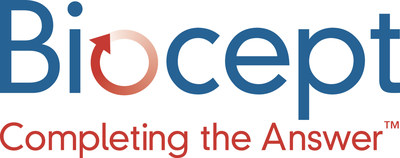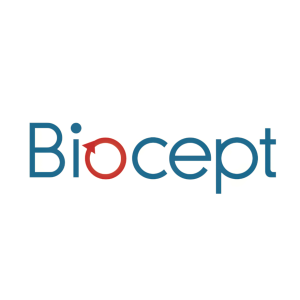Study Shows Biocept's Target Selector™ May Provide a More Robust Method for Detecting Lung Cancer Metastasis in Cerebrospinal Fluid than Cytology
Biocept, Inc. (Nasdaq: BIOC) announced results from a study comparing its Target Selector™ cerebrospinal fluid testing to conventional cytology for diagnosing leptomeningeal metastasis in lung cancer patients. Conducted on 28 samples from 15 patients, Target Selector™ detected circulating tumor cells in 78% of samples, outperforming cytology's 55%. Additionally, it quantitatively identified actionable EGFR mutations, revealing changes in tumor markers before traditional evaluations. Experts view these findings as promising for improving treatment assessments, underscoring the need for further studies in this area.
- Target Selector™ detected circulating tumor cells in 78% of cerebrospinal fluid samples, compared to 55% for cytology.
- Provides quantitative analysis of actionable EGFR mutations, indicating potential for early treatment response assessment.
- None.
Insights
Analyzing...
SAN DIEGO , Oct. 5, 2020 /PRNewswire/ -- Biocept, Inc. (Nasdaq: BIOC), a leading commercial provider of molecular diagnostic tests and services for physicians treating cancer patients, announces results from a prospective study comparing its Target Selector™ cerebrospinal fluid testing to conventional cytology in patients with non-small cell lung cancer (NSCLC) and leptomeningeal metastasis. The results were presented on Friday, October 2, in a virtual poster "Hot Topic: Liquid Biopsy" presentation at the International Association for the Study of Lung Cancer (IASLC) by David Berz, MD, PhD, MPH of the Beverly Hills Cancer Center. The presentation can be found here.
Leptomeningeal metastasis is difficult to diagnose and assess for treatment response using conventional methods such as cytology. In this study, 28 cerebrospinal fluid samples from 15 patients obtained sequentially before and during treatment were compared. Target Selector™ improved detection of circulating tumor cells (CTC), finding CTCs in
"Even in this small study the ability to detect response to this experimental treatment in cerebrospinal fluid using Target Selector™ is promising, particularly as the diagnosis of leptomeningeal disease remains challenging using current methods," said Dr. Berz. "Cytological assessment has limited sensitivity and often requires multiple sample collection attempts. In addition, cytology is a qualitative measurement, whereas Target Selector™ allows for quantitative assessment of treatment response. Given these encouraging results, additional studies of the use of Target Selector™ testing in patients with leptomeningeal disease is highly warranted."
"These results indicate Target Selector™ may play an important role in providing valuable information to neuro-oncologists in making treatment decisions for patient with lung cancer metastases to the brain," said Biocept President and CEO Michael Nall. "As more therapies are developed with the ability to cross the blood brain barrier that target specific cancer related gene and protein alterations, analysis of cerebrospinal fluid to inform early detection and subsequent monitoring for treatment response and disease progression will likely become increasingly important."
About the IASLC 2020 Lung Cancer Hot Topic Meeting: Liquid Biopsy
There have been numerous advances in liquid biopsy since this event's advent in 2018, and the concept of a "blood-first" approach – superseding or replacing tissue biopsy – is a current topic of much debate and discussion. This innovative virtual conference brought together international and multidisciplinary experts in the field of liquid biopsy in lung cancer to present and discuss current technology and best practices for clinical applications based on available data.
About the IASLC
The International Association for the Study of Lung Cancer (IASLC) is the only global organization dedicated solely to the study of lung cancer and other thoracic malignancies. Founded in 1974, the association's membership includes nearly 9,000 lung cancer specialists across all disciplines in over 100 countries, forming a global network working together to conquer lung and thoracic cancers worldwide. The association also publishes the Journal of Thoracic Oncology, the primary educational and informational publication for topics relevant to the prevention, detection, diagnosis and treatment of all thoracic malignancies. Please visit www.iaslc.org for more information.
About Biocept
Biocept, Inc. is a molecular diagnostics company with commercialized assays for lung, breast, gastric, colorectal and prostate cancers, and melanoma. The Company uses its proprietary liquid biopsy technology to provide physicians with clinically actionable information for treating and monitoring patients diagnosed with cancer. The Company's patented Target Selector™ liquid biopsy technology platform captures and analyzes tumor-associated molecular markers in both circulating tumor cells (CTCs) and in circulating tumor DNA (ctDNA). With thousands of tests performed, the platform has demonstrated the ability to identify cancer mutations and alterations to inform physicians about a patient's disease and therapeutic options. In addition, Biocept recently added COVID-19 testing to support efforts to fight the pandemic. For additional information, please visit www.biocept.com.
Forward-Looking Statements Disclaimer Statement
This release contains forward-looking statements that are based upon current expectations or beliefs, as well as a number of assumptions about future events. Although we believe that the expectations reflected in the forward-looking statements and the assumptions upon which they are based are reasonable, we can give no assurance that such expectations and assumptions will prove to have been correct. Forward-looking statements are generally identifiable by the use of words like "may," "will," "should," "could," "expect," "anticipate," "estimate," "believe," "intend," or "project" or the negative of these words or other variations on these words or comparable terminology. To the extent that statements in this release are not strictly historical, including without limitation statements regarding the ability of our tests to provide clinically actionable information, the role Target Selector™ may plan in providing valuable information to neuro-oncologists in making treatment decisions for patient with lung cancer metastases to the brain, and the ability of Biocept's platform to identify cancer mutations and alterations to inform physicians about a patient's disease and therapeutic options, such statements are forward-looking, and are made pursuant to the safe harbor provisions of the Private Securities Litigation Reform Act of 1995. The reader is cautioned not to put undue reliance on these forward-looking statements, as these statements are subject to numerous risk factors as set forth in our Securities and Exchange Commission (SEC) filings. The effects of such risks and uncertainties could cause actual results to differ materially from the forward-looking statements contained in this release. We do not plan to update any such forward-looking statements and expressly disclaim any duty to update the information contained in this press release except as required by law. Readers are advised to review our filings with the SEC, which can be accessed over the Internet at the SEC's website located at www.sec.gov.
Investor Contact:
LHA Investor Relations
Jody Cain
Jcain@lhai.com
310-691-7100
![]() View original content to download multimedia:http://www.prnewswire.com/news-releases/study-shows-biocepts-target-selector-may-provide-a-more-robust-method-for-detecting-lung-cancer-metastasis-in-cerebrospinal-fluid-than-cytology-301145470.html
View original content to download multimedia:http://www.prnewswire.com/news-releases/study-shows-biocepts-target-selector-may-provide-a-more-robust-method-for-detecting-lung-cancer-metastasis-in-cerebrospinal-fluid-than-cytology-301145470.html
SOURCE Biocept, Inc.








